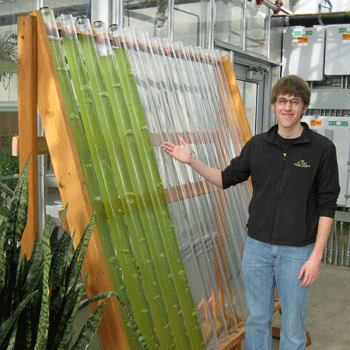October 5, 2010
 |
| Ben '12 with his photobioreactor |
You’d think it would take another Einstein to make a scientific breakthrough as far-fetched as making a car run off of pond scum. But a young scientist has recently proven that just such a thing is possible. And he doesn’t go by Einstein. He goes by Ben.
Ben Auch '12 poses with the photobioreactor that got him the EPA fellowship. "We have the potential as a nation to be world leaders in the science and technology that could transform our world into one that is renewable and sustainable, instead of one driven by consumption and waste," he says. "Being a small, small part of this larger opportunity is both exciting and humbling." Submitted photo.
Ben Auch '12, a St. Olaf chemistry major with a concentration in biomolecular science, understands the urgency and enormity of the energy crisis and is dedicated to working toward a solution. When he came to St. Olaf two years ago, Auch created an independent research project that examines microalgal biofuels as a potential substitute for diesel fuel. Not only is his research on the cutting edge of science, but it recently won him an Environmental Protection Agency (EPA) Greater Research Opportunities fellowship for $48,900.
Auch’s research focuses on algae — the very stuff that grows in golf course ponds and on the side of boats. Algae are microscopic plants that have a great capacity to store energy. These plants produce triglycerides, which is the same kind of fat molecule humans store. Triglycerides can be extracted from the algae, chemically converted, and then used in diesel vehicles as a direct substitute for diesel fuel. Studies show that biofuels could potentially replace approximately 10 percent of our total energy consumption, with transportation energy being only a small fraction of that.
An energy opportunity
Last summer, Auch built a photobioreactor (a series of 14 algae-growing test tubes, each approximately six feet tall) and grew algal cultures in a friend’s basement. “The neighbors thought I was nuts,” Auch says. But his project, as well as his on-campus lab research at St. Olaf last year and a job at the Great Lakes Bioenergy Research Center in Madison, Wisconsin, this past summer, made Auch a strong candidate to receive the fellowship.
"What’s exciting to me is that our national and global energy problem, both in terms of our energy independence and global climate change, can be an energy opportunity," Auch says. "We have the potential as a nation to be world leaders in the science and technology that could transform our world into one that is renewable and sustainable, instead of one driven by consumption and waste. Being a small, small part of this larger opportunity is both exciting and humbling."
Auch’s interest in biofuels goes back a few years. When he arrived at St. Olaf, Auch approached Associate Professor of Chemistry Greg Muth about research. "This was quite a reversal, as it is the faculty who are usually recruiting students to join their labs," Muth says. "Ben's enthusiasm and thoughtful plans for building a photobioreactor over the summer made it impossible to say no."
But Auch realizes that his research is just the first step in making the transition to using microalgal biofuels. "Of course it sounds easy, but in reality there are a lot of concerns ," Auch says. "The key point is that the ultimate solution to alternative, renewable transportation fuels will be a combination of many different processes — there’s no single answer to our energy problems. We don't know enough now to know which biofuels will work and which won’t. We have to take our time and do the research."
A love for the lab
Auch’s personal passion is infectious, say faculty members who have worked with him and his fellow peers, whom he tutors in biology. "Ben is altruistic. He loves being in the lab and sharing his excitement about algae-based biofuels with others. He is creating a campus group focusing on bioenergy and has plans to generate projects in the local schools to turn kids on to science. He sees the importance of his work educationally, economically, and environmentally," Muth says.
The fellowship money Auch received from the EPA will go toward tuition, a stipend for an internship at an EPA research facility next summer, research supplies, and travel expenses to various science conferences. The award will help put Auch on the path to his dream career in renewable energy research. He plans to get his Ph.D. in the biological sciences related to biofuels and bioenergy. From there he would like to pursue research related to synthetic or systems biology and bioenergy.
"My favorite part of doing research with algae is, frankly, more aesthetic than intellectual. I think every scientist has an innate desire to work with green, bubbly, glowing test tubes. It’s that classic mad-scientist image. That’s exactly what you see when you walk in our lab," Auch says. "On a good day, it's green everywhere."
No comments:
Post a Comment